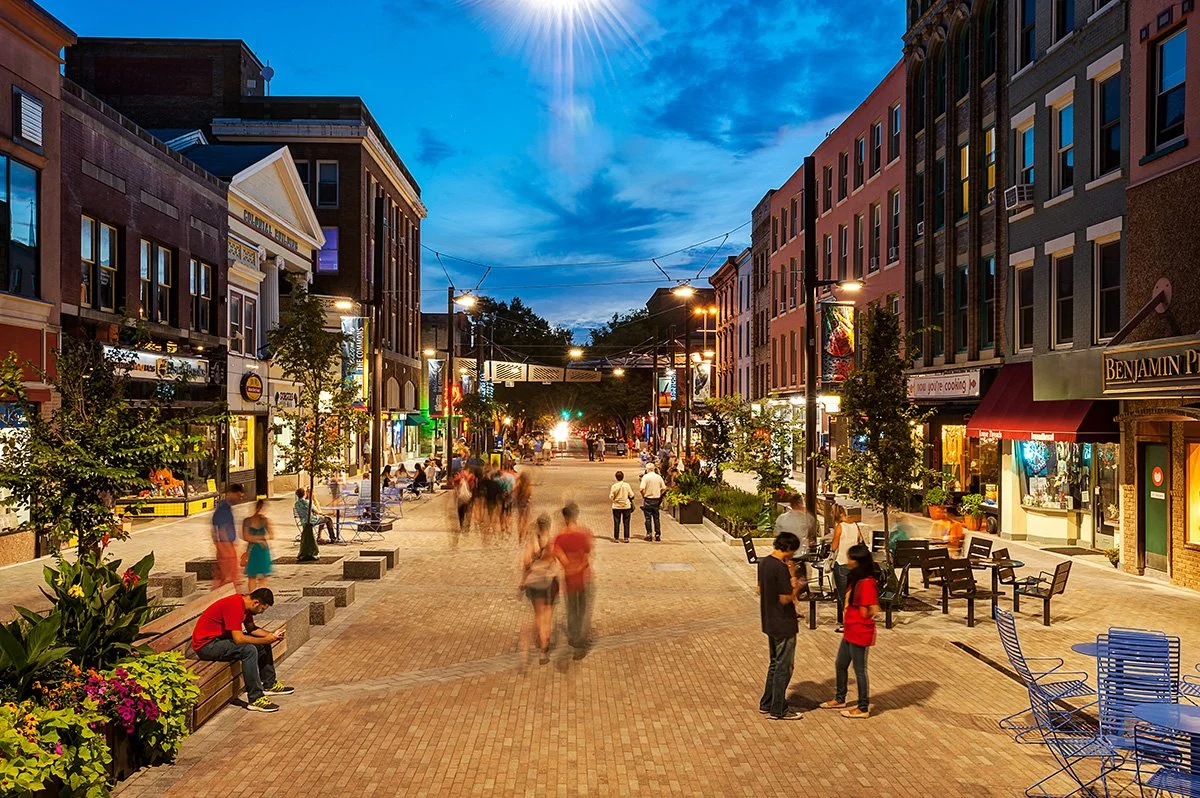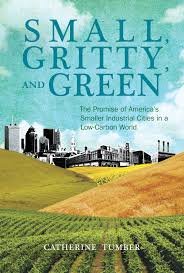Ithaca Commons, (Christian Phillips Photography)
"The Challenge and Opportunity of Greening America’s Small Cities”
-A CONVERSATION -
DR. CATHERINE TUMBER (Small, Gritty, and Green) &
DR. LUIS AGUIRRE-TORRES (Sustainability Coordinator, City of Ithaca)
>> RECAP & VIDEO <<
How do we decarbonize our smaller post-industrial cities—which are seeing a second coming?
Small cities are having their moment. During Covid we saw strong migration patterns out of large cities to an array of smaller legacy cities—which offer affordability, a high quality of life, a multitude of real estate opportunities, access to the outdoors, remote work options, and a strong sense of community. These newcomers are changing the face of these small cities, and with their arrival come important questions of equity, access, and inclusion.
Some of the biggest questions are around how we can decarbonize these places to meet our aggressive climate goals. The transportation sector is a huge source of greenhouse gas emissions within counties that contain small legacy cities. In the cities themselves, retrofitting and electrifying commercial and residential buildings are also challenging, as small legacy cities often feature old housing stock, dormant industrial spaces, budgetary constraints, a lack of a trained “green” workforce, and entrenched, outdated ideas of economic development. Yet there are also huge opportunities for green investment in these small cities—leaning into community networks, testing out pilot projects for electrification, district geothermal, energy storage, hyper-local urban food systems, and community solar projects.
During this dialogue, we will first hear from Dr. Catherine Tumber, author of Small, Gritty, and Green, who has been working on an inventory of small city sustainability plans for the Lincoln Instute for Land Policy. She will provide a national portrait of what small cities are doing to green themselves, where they are succeeding and struggling, and what trends we will see over the next decade.
We will then examine the case study of Ithaca, NY, where Dr. Luis Aguirre-Torres, the city’s sustainability coordinator, has created an extraordinary funding model to decarbonize 4,000 buildings in the city. While every city can’t be Ithaca, there are many lessons to be learned from Dr. Aguirre-Torres’s work.
After their presentations, we will have a conversation and answer questions for the audience. Join us for an exciting event that will offer solutions and point to the potential lucrative future of financing municipal decarbonization.
Speakers:
DR. CATHERINE TUMBER has worked as a researcher, writer, and editor for MassINC’s Gateway Cities Innovation Institute, and is a Penn Institute for Urban Research scholar. She holds a doctorate in U.S. social and cultural history from the University of Rochester. Dr. Tumber's books include Small Gritty and Green: The Promise of America’s Smaller Industrial Cities in a Low-Carbon World (MIT Press, 2012). She is currently co-authoring a Lincoln Institute of Land Policy report on preparing small and midsize U.S. legacy cities for climate change. Dr. Tumber spent most of her life in Upstate New York, and grew up in Baldwinsville. For more info, visit: catherinetumber.com
DR. LUIS AGUIRRE-TORRES is the director of sustainability for the City of Ithaca, where he leads the implementation of the Ithaca Green New Deal, including the City’s Net-Zero 2030 and Justice50 strategies. Prior to joining the City of Ithaca, he spent 12 years assisting Latin American countries develop innovation and climate change legislation, sponsored by USAID and the US State Department, implementing long-term climate change and climate justice projects, sponsored by the UN Industrial Development Organization, the IFC-World Bank and the Breakthrough Energy Coalition. He is the founder of GreenMomentum, a market-intelligence and innovation firm focused on climate change and clean technology, as well as Cleantech Challenge and Cleantech Labs, the largest cleantech and hard-tech business incubators in Latin America. Since 2010, he led an ambitious climate justice program in Latin America, for which he was recognized as Champion of Change by President Obama in 2012 and by the White House Office of Science and Technology in 2016. He holds a degree in Computer Engineering, a Master’s in Computer Science and a PhD in Electrical and Electronic Engineering from University College London.
Each speaker will give a short presentation followed by a conversation with Reif Larsen, founder of The Future of Small Cities Institute, and Q&A from the audience.
FURTHER READING:
“Greenventory 2.0 Sustainability Lessons from Small and Midsize Legacy Cities” Lincoln Institute for Land Policy
Small, Gritty, and Green (MIT Press)
“The US city that has raised $100m to climate-proof its buildings” The Guardian.
“Greening an Entire City: The Ithaca Model” Commercial Property Executive.
“How Two Smaller Cities Are Adopting Green Infrastructure” Next City.
“Ithaca’s novel plan to eliminate carbon from buildings” The Carbon Copy Podcast.
>> RECAP & VIDEO <<
EVENT SPONSORS:
This event is being presented in partnership with the Lincoln Institute of Land Policy as part of a larger series about sustainability and equity in smaller legacy cities. To sign up for Lincoln Institute’s newsletter, click here.


















